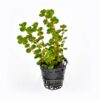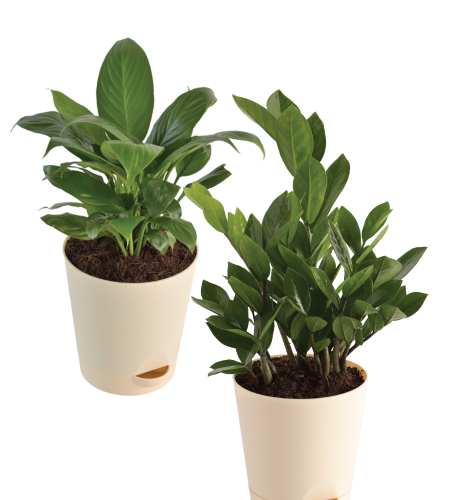Rotala rotundifolia ‘Green’ [Tc] or Rotala rotundifolia ‘Green’ looks a lot like Rotala rotundifolia, but its leaves stay fresh and bright green even in direct sunlight. The stems grow to be 40-50 cm long and 2-3 cm broad. The plant generates many side shoots willingly and grows to be attractive, bushy, and “hanging.” To ensure healthy growth, prune it on a regular basis. An excellent beginning plant that looks best in huge groups. This plant, known in the aquarium plant trade as Rotala sp. “Green,” appears to be a variant of the very variable Rotala rotundifolia. The submerged form of R. rotundifolia “Green” has the following characteristics: a) completely green leaves and stems b) weeping tendency (shoots grow straight at first, then bow down), and c) always just 2 (never 3 or more) leaves per node. Other green variants of Rotala rotundifolia are often marketed in trade under that name; nevertheless, their submerged stems still have at least a reddish colour and grow absolutely upright, unlike real “Green.” If the overhanging habit of true R. rotundifolia “Green” does not complement the arrangement, these plants are an option. This common development pattern, on the other hand, might be an intriguing design component. Rotala rotundifolia “Green” is another name for Rotala sp. “Green.” Unlike “regular” R. rotundifolia, the “Green” variation never turns reddish and retains its bright green colour even in direct sunlight. The plant’s growth habit is bushy and beautifully overhanging. Because this plant grows quickly, a thorough trimming is recommended on a regular basis. Amano brilliantly employs the Rotala’s unique overhanging growth habit in several of his aquascapes.
It is tolerant of a wide range of water parameters and is a simple plant to grow; after a period of adjustment, it does well even in aquariums without carbon dioxide injection. However, having enough light and CO2 allows it to grow with greater density and coloration.
They grow continuously towards the light as stem plants and can reach the top of even tall aquariums. If allowed to reach the water’s surface, it will eventually breach the surface and grow emersed leaves and flowers. When stems are planted in a tank with plenty of light and space, they will grow downwards and creep along the substrate. They will grow vertically more readily if planted in a more crowded area.
When in fast growth mode, the plant branches more profusely, and when conditions are lean, the plant grows more vertically with less branching (either low CO2 or low nutrients).
Important success factors:
Enough light (medium and above) to achieve good coloration
Avoid using water with extreme parameters (high alkalinity or uncycled tanks)
How to make Rotala rotundifolia ‘Green’ [Tc] more green :
A brighter light (higher PAR values)
Low nitrates (5ppm or less) while keeping other parameters high
Rotala Rotundifolia is one of the plants that exhibits redder colours when nitrate levels are low, which means that the plant grows much redder when nitrate levels are low. If you overdo it, the plant will stunt. It is, however, much more tolerant of low nitrogen levels than other plants. When running low-nitrate levels in a tank, make sure to select plants that adapt well to lean dosing conditions. On this page, you can learn more about lean dosing. When it comes to coloration, it is more sensitive to water column NO3 levels than, say, ammonia in the substrate zone. The best-looking bushes are those that have some ammoniacal nitrogen in the rootzone while keeping the water column low in Nitrates (NO3). Being nitrogen-deficient in both the substrate and the water column can result in plants that are thin and have little branching, making it difficult to form dense bushes.
For those interested in testing their water, the Seachem nitrate test kit has slightly higher accuracy readings for low NO3 levels.Rotala H’ra is lit by Twinstar S series lighting in the image below. Such deep red colours require severe nitrate limitation – NO3 levels would almost always test negative on test kits. It doesn’t have a lot of branching, and the bush density is about average.
Propagation:
Replant after cutting a couple of inches off the top of the plant. New shoots will grow from the inter-nodes left on the stem. If the original plant was healthy, you can remove the majority of it, leaving stems a couple of inches tall, and new shoots will sprout from there.Plant stems at least half an inch apart to allow for side-shoots, even if you want a dense bush. Even if you want a dense canopy at the higher levels, there should be enough space in the bottom layers.
Trimming:
Rotala rotundifolia tolerates pruning well and forms dense bushes. It can be trimmed repeatedly for many cycles before needing to be replanted with healthier/new tops. This makes it particularly useful for aquascaping, where the ridge line must be maintained at a specific height.Trimming should begin about 4 inches below the desired final height of your Rotala rotundifolia tops. (Unless you planted your Rotala rotundifolia sparingly to begin with, in which case trimming further down allows more branching and density to develop) Cut off the tops that grow faster than the rest as they grow out, allowing the shoots below to branch and the canopy to gain density as it grows upwards.
After the canopy has reached the desired height, thin it out by cutting off the tallest shoots and allowing new growth to take their place. This must be done on a regular basis (every 3 days or so). If the canopy rises overall after a long period of no trimming, you must do a reset as described above, cutting the bush much lower and growing out the tops again. As with carpets, it must be trimmed on a regular basis if you want it to last. Growing the tank under lean conditions slows overall plant growth and reduces pruning.Over time (months), the older undergrowth will deteriorate to an unhealthy state. Allow the top to grow out longer before replanting the bush as a whole.
Is CO2 required for Rotala rotundifolia ‘Green’ [Tc]?
It is tolerant of a wide range of water parameters and is a simple plant to grow; after a period of adjustment, it does well even in aquariums without carbon dioxide injection. However, having enough light and CO2 allows it to grow with greater density and coloration.
Is Rotala rotundifolia capable of turning red?
The classic Rotala rotundifolia does not turn truly red, but rather an orange-reddish colour (see picture). If a bright red or pink is what you’re after, Rotala sp. “colorata” (shown) or Rotala sp. “pink” (shown) are good choices.
Can Rotala survive in the absence of CO2?
The Rotundifolia is a perennial plant in the Rotala Genus that is relatively easy to care for without CO2.


![Rotala rotundifolia 'Green' [Tc]](https://elysianflora.com/wp-content/uploads/2021/12/Tishu_products_10.jpg)
![Rotala rotundifolia 'Green' [Tc] - Image 2](https://elysianflora.com/wp-content/uploads/2021/12/Plant_38.jpg)






Reviews
There are no reviews yet.